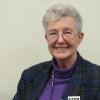I was shocked when I realized what the Women's Center of Wake County, North Carolina, was not.
It is the only women's day facility in the Raleigh-Durham area, and as we pulled up to the attractive building Oct. 29, I was impressed. It is clean, newly decorated with fresh paint and artwork, and features amenities like three meals a day, medical and mental health evaluations and support, a clothing closet, a library/reading room, a recreation room with a tuned piano, and pleasant sitting areas. There is even a rest room, where women can go be by themselves, safe and unbothered.
The new executive director, Brace Boone, says they take in clients "wherever they are" with respect and compassion and provide them with access to drug treatment and rehabilitation if needed during the day. Then he showed us a room full of bedding and opened the back door to the parking area. Though he had said at any one time they may have 20 to 30 women sleeping in the area, I didn't realize what he meant until he showed us the parking area.
When the women leave the Women's Center at night, they are back on the street, sleeping in the parking garage or in the nearby woods. At least they are provided with a roof (the parking garage's), access to a clean portable toilet, and clean bedding. We talked to a few women who said they feel safe sleeping in the parking area and appreciate the changes Mr. Boone has made to make the center more like a home.
But the underlying reality is that the Raleigh-Durham metropolitan area has inadequate beds for its homeless women. Everywhere we have gone on the bus pilgrimage, lack of affordable housing has been a constant reality. An angry woman accosted me in the Women's Center parking lot: "When the apartments rent for $900 per month and my minimum wage is $7.25, how can I pay for housing?"
How would you have answered her?
Other women told us that many middle-class women are just one medical bill, the loss of a job, or the death of their husband away from life on the street. It can only get worse.
However, not far away in Durham, North Carolina, three women are working wonders.
I was prepared to like Farmer Foodshare when we arrived later that day because I knew a garden and bees were involved. Director Gini Bell gave us a good tour of the community garden and beehives. Bee the change we wish to see in the world!
When we returned to Farmer Foodshare's headquarters, a rehabilitated and repurposed double-bay Gulf gas station, we saw the storehouse and locker space where they store food purchased from local farmers to be distributed to hungry people, benefiting both the farmers and the people who lack fresh and wholesome food.
Then we met Gini's landlady, Quisha Mallette, whose Reinvestment Partners repurposes buildings for nonprofits, like Farmer Foodshare's gas station, and affordable housing.
Finally, community organizer and activist Camryn Smith described her Communities in Partnership programs, which have multiple creative projects addressing a variety of urban problems, especially feeding the hungry.
Convinced that food insecurity results from state politics and policies, she asked herself how food moves and who has access to it. She founded a donation station at a local farmers market, which could serve as a model for any town with a farmers market: It provides a wholesale market for family farms as well as a source of fresh food for people living in urban food deserts without access to fresh produce.
Communities in Partnership founded a faith-based co-op to serve almost 200 households, with classes and programs to teach people how to use fresh produce. She introduces children to unfamiliar foods in fun ways and reconnects people with their historical foods. For example, her students, who were used to only eating the green tops of turnips, were shocked to learn you could eat the turnip, too!
We were blown away by the example of these three women, who had independently discovered creative solutions to their community problems then wove them into a collaborative effort. The very constraints imposed on their communities seemed to stimulate their creativity; in a very feminine way, they had let empathy lead them to action.
On Oct. 30, we continued south and had a roundtable discussion with a group of South Carolinians at the beautiful state capitol in Columbia.
Leaders of projects that included services to immigrants and people who are homeless, the Sisters of Charity Foundation, legal advocacy groups, and the Women's Rights and Empowerment Network painted a vivid picture of the state of the state of South Carolina.
Again, the need for affordable housing was toward the top of the list. U.S. Rep. Jim Clyburn said that as a result of the new federal tax bill, 232,000 units of affordable housing will not be built. He also noted that traditional agriculture and textile industries have gone to Asia, but tourism is the state's No. 1 business, and if visas are harder to get, the bottom will fall out of that market. A third concern was that the new tax bill contains taxes on charities and places of worship.
As much as I have noted the conspicuous absence of previously invited congresspeople, we had two friends in Representative Clyburn and U.S. Rep. David Price of Raleigh, North Carolina. They represent their districts well and were happy to appear with the Nuns on the Bus.
On to Georgia!
[Ursuline Sr. Michele Morek is Global Sisters Report's liaison to sisters in North America. Her email address is mmorek@ncronline.org. Follow her on Twitter: @MicheleMorek.]





